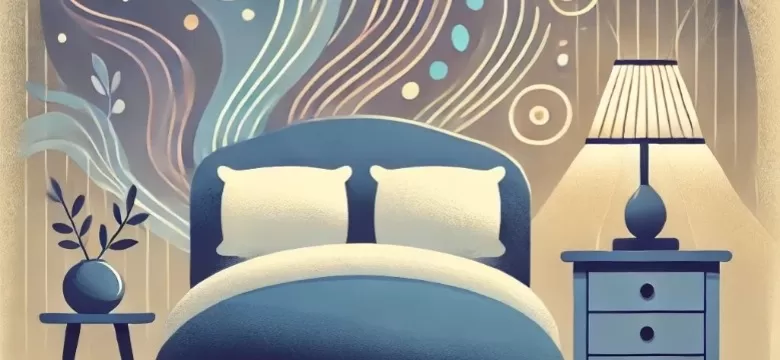Introduction
Sleep disturbances are among the most frustrating symptoms women face during menopause, impacting everything from energy levels to mental well-being. Many women struggle with sleepless nights, tossing and turning while battling hot flushes, anxiety, or a restless mind. But sleep changes during menopause are not just inconvenient; they can have a profound effect on quality of life. Today, we’ll delve into why menopause impacts sleep, explore the specific challenges faced, and share practical, empowering strategies for finding rest again.
Why Does Menopause Impact Sleep?
The hormonal changes that occur during perimenopause and menopause are at the root of many sleep issues. As women move through perimenopause (the years leading up to menopause) and reach menopause itself, the levels of key hormones like oestrogen and progesterone start to decline. These hormones play critical roles in maintaining the sleep-wake cycle, regulating body temperature, and supporting relaxation, so fluctuations can directly lead to sleep disruptions.
Oestrogen plays a significant role in stabilising the body’s temperature, supporting neurotransmitter function, and maintaining sleep architecture—meaning the structure of sleep that includes deep sleep and REM sleep. As oestrogen levels decrease, many women find themselves waking up repeatedly during the night or struggling to fall back asleep.
Progesterone, on the other hand, has a calming effect that makes it easier to relax and fall asleep. As its levels drop, many women find it harder to unwind, experiencing increased anxiety, restlessness, or difficulty initiating sleep.
Beyond hormones, the lifestyle stressors that many women experience during midlife, including career pressures, caregiving responsibilities, and changing family dynamics, can further exacerbate sleep issues. This combination of physiological and emotional factors can make sleep disturbances especially challenging.
Common Sleep Challenges During Menopause
There are several specific sleep issues that many women experience during this phase, including:
- Difficulty Falling Asleep: Declining progesterone levels can make it difficult to relax and initiate sleep. Many women find that anxiety and restlessness are increased during menopause, which further complicates the process of falling asleep.
- Night Sweats and Hot Flushes: The infamous hot flushes that accompany menopause are often at their worst at night, leading to night sweats that can leave you feeling overheated and uncomfortable. These temperature disruptions make it difficult to get back to sleep and may happen multiple times each night.
- Frequent Awakening: During menopause, women often find that they spend more time in lighter stages of sleep, which makes it easier to wake up to minor disturbances. This fragmentation leads to poor sleep quality and less time spent in the deep, restorative stages of sleep.
- Nocturia (Frequent Night-time Urination): Hormonal changes can also affect the bladder, leading to increased frequency of urination during the night, known as nocturia. This repeated disruption to use the bathroom makes it even harder to get a good night’s rest.
- Mood Disorders: Anxiety and depression are closely linked to menopause, largely due to hormonal fluctuations. Both of these conditions can severely impact sleep, leading to insomnia or restlessness.
- Sleep Apnea and Restless Legs Syndrome: During menopause, women are at an increased risk for sleep disorders such as sleep apnea and restless legs syndrome. Both conditions can lead to disrupted sleep, impacting overall quality.
Practical Solutions for Better Sleep During Menopause
The good news is that sleep disturbances, while challenging, are not insurmountable. There are numerous strategies and treatments that can help you regain restful sleep and improve your quality of life.
- Creating the Optimal Sleep Environment. One of the first steps in improving sleep quality is to establish an environment that promotes rest:
- Keep It Cool: Because hot flushes and night sweats are major contributors to sleep disturbances, maintaining a cooler bedroom can help. Aim to keep your bedroom between 15-19°C (60-67°F), and consider using a fan or wearing moisture-wicking sleepwear to stay comfortable.
- Minimise Disruptions: Use blackout curtains to keep light out, and consider using a white noise machine or earplugs to block out any noise. Maintaining a quiet, dark environment can help you stay asleep through the night.
- Prioritise Comfort: Comfortable bedding and a supportive mattress can make a big difference in sleep quality, especially if you find yourself waking up frequently due to discomfort.
- Establishing Consistent Sleep Habits
- Stick to a Routine: Go to bed and wake up at the same time every day—even on weekends. A consistent sleep schedule helps regulate your internal clock and improves sleep quality over time.
- Create a Relaxing Pre-Sleep Routine: Developing a consistent bedtime ritual can help signal your body that it’s time to wind down. Whether it’s taking a warm bath, practicing gentle stretching, reading, or meditating, choose activities that calm you.
- Limit Screen Time: The blue light emitted from phones, tablets, and computers can interfere with melatonin production. Avoid screens for at least an hour before bedtime to allow your body to prepare for rest.
- Hormone Replacement Therapy (HRT)
HRT is often a highly effective treatment for alleviating menopause-related symptoms, including sleep disturbances. By replenishing declining oestrogen and progesterone levels, HRT can help address the root causes of poor sleep, including hot flushes, mood fluctuations, and night sweats. However, HRT isn’t suitable for everyone, and decisions regarding hormone therapy should always be made in consultation with a healthcare provider.
- Mindfulness and Relaxation Techniques: Relaxation techniques can be incredibly effective for combating anxiety and facilitating sleep:
- Mindfulness Meditation: Practicing mindfulness can help reduce racing thoughts that make it hard to fall asleep. Deep breathing exercises, body scans, and progressive muscle relaxation can also help relax the body and mind.
- Yoga and Stretching: Gentle stretching or restorative yoga poses can help relieve physical tension and prepare the body for sleep.
- Exercise During the Day
Engaging in regular physical activity is not only good for your physical health but also for sleep quality. Exercise helps to regulate mood, relieve stress, and promote deeper sleep. However, try to avoid vigorous exercise in the late evening, as it can have an energising effect that interferes with sleep.
- Dietary Adjustments: Diet can also play a significant role in promoting good sleep:
- Avoid Stimulants: Caffeine and alcohol can both interfere with sleep quality, so it’s best to limit their consumption, especially in the hours leading up to bedtime.
- Hydration Balance: Staying hydrated is important, but drinking too much liquid right before bed can lead to frequent bathroom visits. Try to balance fluid intake throughout the day to avoid nighttime disruptions.
- Sleep-Supportive Foods: Incorporate foods that help support sleep, such as those rich in magnesium (e.g., leafy greens, almonds) or foods that contain tryptophan (e.g., turkey, oats). These nutrients help relax muscles and support melatonin production.
- Cognitive Behavioural Therapy for Insomnia (CBT-I)
CBT-I is an effective, structured therapy designed to address the thoughts and behaviours that contribute to insomnia. It can be particularly helpful for women who experience persistent sleep issues during menopause. Techniques such as sleep restriction, stimulus control, and cognitive restructuring can help retrain the mind and body to establish healthier sleep patterns.
Seeking Support and Acknowledging Your Needs
Menopause is a significant transition that can bring about changes to your health, well-being, and identity. Sleep disturbances are often one of the most frustrating aspects of this time, but they are also among the most manageable. The key is to address these changes holistically—considering hormone therapy, lifestyle modifications, and the power of mental health interventions. It’s also important to seek support and acknowledge your own needs. Don’t be afraid to ask for help, whether it’s from a healthcare provider, a support group, or a trusted friend.
Remember, you are not alone in this journey. Sleep is not just a luxury—it’s a crucial part of your overall health. By understanding the changes taking place in your body and taking proactive steps to create a sleep-friendly environment, you can navigate this transition with greater ease and reclaim restful nights.

